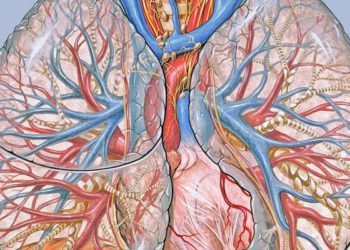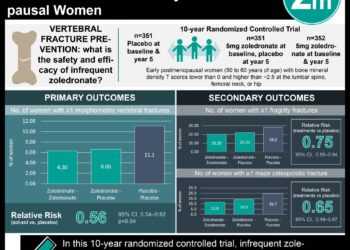Hormone therapy may not prevent atherosclerosis in menopausal women
1. In this randomized, controlled trial of healthy menopausal women, hormonal therapy did not slow the progression of atherosclerosis.
2. Depending on the hormonal therapy, there were small improvements to lipoprotein cholesterol levels and insulin resistance.
Evidence Rating Level: 1 (Excellent)
Study Rundown: Cardiovascular disease (CVD) is the leading cause of death in women. Despite the increased risk of CVD after menopause, it is not known whether menopausal hormone therapy (MHT) can slow its progression. Therefore, the authors performed a randomized, controlled trial of healthy, menopausal women and assigned either hormonal therapy or placebo. Both the carotid artery intima-media thickness (CIMT) and coronary artery calcium (CAC) were assessed as measurements of atherosclerosis. The study found no significant difference in these measures of atherosclerosis between those that received MHT and placebo. There was also no difference in blood pressure, but depending on the type of hormonal therapy, there were some changes to cholesterol levels, insulin resistance, and C-reactive protein (CRP). The major limitation of this study is that there were too few cardiovascular-related clinical events to evaluate MHT’s affect on CVD development. Overall, MHT does not appear to prevent the progression of atherosclerosis in menopausal women.
Click to read the study in Annals of Internal Medicine
In-Depth [randomized controlled trial]: Previous studies of menopausal women and CVD risk were performed in older women. To determine if the cardioprotective effect of MHT was age-dependent, this trial only included women within 3 years of their last menses. In those given HMT, they received either oral conjugated equine estrogens (o-CEE) or transdermal 17β-estradiol (t-E2), each with oral progesterone for four years. The differences in CIMT between o-CEE and t-E2 to placebo were 0.0008mm/y [95%CI=-0.0012-0.0029] and 0.0005mm/y [95%CI=-0.0016-0.0026], neither of which was significant. The percent of those who had an increase in CAC scores with age were also similar, o-CEE with 17.4%, t-E2 with 18.9%, and placebo with 21.0%. o-CEE decreased LDL and increased HDL, CRP, and SHBG, whereas t-E2 decreased total lipoprotein and insulin levels, as well as the Homeostasis Model Assessment of Insulin Resistance score. HMT was verified to be able to improve menopausal symptoms and increase estrogen levels. This study shows that recently menopausal women may only have small improvements to some CVD risk factors, but not overall atherosclerosis.
More from this author: Less frequent echocardiography for cancer survivors may be more cost effectivePrenatal screening and postnatal prophylaxis may prevent vertical Hep B transmissionLow-strength evidence for hepatocellular carcinoma screening in liver diseaseEfavirenz (Sustiva) for HIV patients may increase risk of suicideSocial integration may reduce suicide risk in male health professionals
Image: PD
©2012-2014 2minutemedicine.com. All rights reserved. No works may be reproduced without expressed written consent from 2minutemedicine.com. Disclaimer: We present factual information directly from peer reviewed medical journals. No post should be construed as medical advice and is not intended as such by the authors, editors, staff or by 2minutemedicine.com. PLEASE SEE A HEALTHCARE PROVIDER IN YOUR AREA IF YOU SEEK MEDICAL ADVICE OF ANY SORT.







